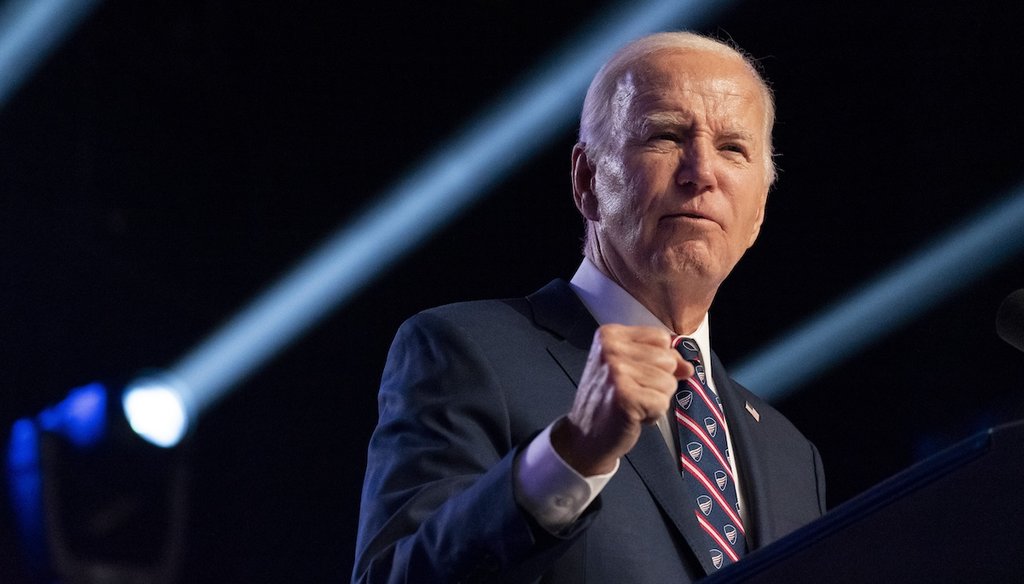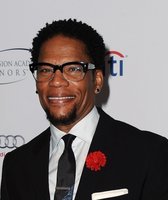Stand up for the facts!
Our only agenda is to publish the truth so you can be an informed participant in democracy.
We need your help.
I would like to contribute

President Joe Biden speaks at a campaign event at Montgomery County Community College in Blue Bell, Pa., Jan. 5, 2024. (AP)
President Joe Biden wasted little time jumping on a remark by former President Donald Trump, in which Trump invoked Herbert Hoover, who was president during the Great Depression’s onset in 1929.
Trump told former Fox Business host Lou Dobbs that he was hoping that the economy would crash within the year, while Biden is president.
"And when there’s a crash — I hope it’s going to be during this next 12 months, because I don’t want to be Herbert Hoover," Trump said in the interview, which aired Jan. 8 on a network owned by Mike Lindell, the Trump-aligned founder of MyPillow. "The one president I just don’t want to be, Herbert Hoover."
Biden responded to his potential 2024 opponent in a video.
"They showed me the clip of Trump saying he wanted the economy to crash so he could gain politically," Biden wrote Jan. 11 on X. "Says he doesn’t want to be Hoover. Here's the thing: He already is. He’s the first president since Hoover to lose jobs while in office. Some record."
We checked the numbers and found that Trump is, as Biden said, "the first president since Hoover to lose jobs while in office."
However, Biden ignores that a lot of job gains and losses during presidents’ terms hinge on luck. Economists said Trump’s final jobs number says little about his economic stewardship.
During Trump’s presidency, the U.S. lost a net 2.7 million jobs.
In comparison, every president since Harry Truman (who served from 1945 to 1953) has gained jobs during his tenure. Bill Clinton, who left office in 2001, oversaw the biggest gain at nearly 23 million, and George W. Bush, who left office in 2009, saw the smallest gain at almost 1.4 million.
The federal government didn’t keep comparable statistics during Hoover’s term (1929 to 1933) or through much of the tenure of his successor, Franklin Roosevelt. But experts say it’s certain the Great Depression would have resulted in a net loss of jobs under Hoover and the recovery would have produced a net gain of jobs under Roosevelt.
Although presidents can influence some job creation through policy, this power is not limitless. Many other factors beyond a president’s control can have an effect, including the global economy’s health and improvements in technology. So, for a president, taking credit or accepting blame for economic performance should be taken with a big grain of salt.
Timing matters — a lot.
The coronavirus pandemic hit while Trump was in office, prompting an unprecedentedly rapid decline in unemployment. Efforts to restrain the virus sparked major cutbacks in hospitality, entertainment and restaurants. This quickly wiped out the job gains that Trump had amassed during his first three years in office — and he never got the chance to regain those jobs during a second term, since he lost to Biden in 2020.
Biden’s timing has been favorable. He was inaugurated in January 2021, as the pandemic was starting to recede. Although the jobs recovery began under Trump, Biden benefited from the steady flow of Americans back into jobs that had been hampered during the pandemic.
"Trump certainly could have responded better to it, but it was a worldwide phenomenon, not of his making," said Dean Baker, an economist at the liberal Center for Economic and Policy Research.
Douglas Holtz-Eakin, president of the right-of-center American Action Forum, agreed that the pandemic was "not comparable" with earlier examples of economic shocks, such as those caused by wars or oil shortages.
"No policy could have stopped the job losses early in the pandemic," he said.
Also, lessons learned from the Great Depression helped make the pandemic recession reverse itself with unexpected speed, said Gary Burtless, an economist at the Brookings Institution, a Washington, D.C.-based think tank.
"Economic policy after March 2020 was not perfect, but it was vastly better than economic policy from the 1929 crash up through the beginning of Roosevelt’s first term in March 1933," Burtless said. "President Trump and his senior advisors played an important role in economic decision-making after March 2020, and deserve partial credit for policies that produced a rapid economic recovery," along with congressional Democrats.
Trump and Congress signed several rounds of pandemic relief legislation that included stimulus payments to families and loans to businesses to keep their doors open, softening the economic blow.
By the time Trump left office in January 2021, almost 58% of the jobs that had been lost were back. Employment returned to its pre-pandemic level about a year and a half into Biden’s term, in July 2022, and has continued rising ever since.
Our Sources
Joe Biden, post on X, Jan. 11, 2024
Federal Reserve Bank of St. Louis, all employees non-farm, accessed Jan. 12, 2024
Business Insider, "Trump says he hopes the US economy will crash within the next year to avoid being a 'Herbert Hoover,’" Jan 9, 2024
The Hill, "‘He doesn’t give a damn about people:’ Biden campaign hits Trump comments on economy crashing," Jan. 9, 2024
PolitiFact, "Joe Biden’s boast about job creation needs some asterisks," Feb. 7, 2023
Email interview with Dean Baker, co-founder of the Center for Economic and Policy Research, Jan. 12, 2024
Email interview with Gary Burtless, senior fellow with the Brookings Institution, Jan. 12, 2024
Interview with Douglas Holtz-Eakin, president of the American Action Forum, Jan. 12, 2024




































